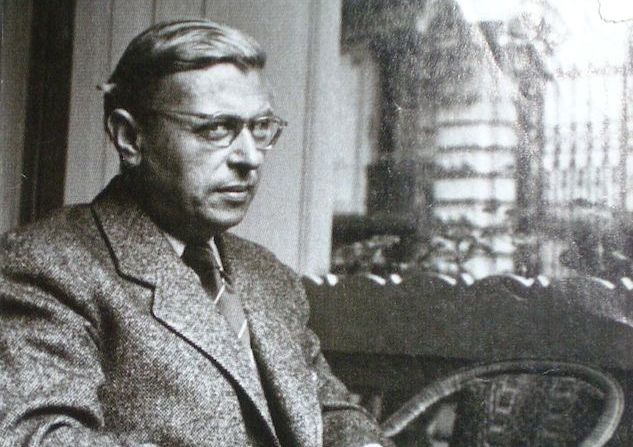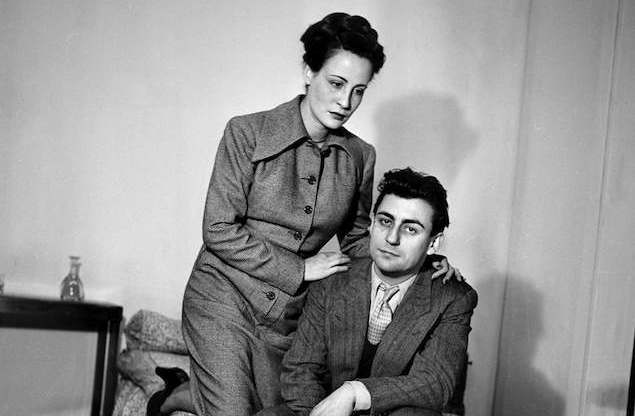Leisure • Western Philosophy
Jean-Paul Sartre
Jean-Paul Sartre was born in 1905. His father, a navy captain, died when he was a baby – and he grew up extremely close to his mother until she remarried, much to his regret, when he was twelve. Sartre spent most of his life in Paris, where he often went to cafes on the Left Bank and sat on benches in the Jardin du Luxembourg. He had a strabismus, a wandering eye, and wore distinctive, heavy glasses. He was awarded the 1964 Nobel Prize for literature, but refused it on the grounds that the award was capitalist and bourgeois. He was very short (five feet three inches) and frequently described himself as ugly. He wore his hair vigorously brushed back. When he died in 1980 (aged 74), 50,000 people accompanied his coffin through the streets of Paris.
Sartre became famous as the key figure in the philosophical movement known as Existentialism. He made thinking and philosophy glamorous. He wrote a dense, hard-to-follow book called Being and Nothingness, which enhanced his reputation not so much because people could understand his ideas but because they couldn’t quite. Sartre was the beneficiary of a desire, which became widespread in the second half of the twentieth century, to revere books for the mystery they appeared to touch, rather than for the clarity of their claims.
Existentialism was built around a number of key insights:
One: Things are weirder than we think
Sartre is acutely attentive to moments when the world reveals itself as far stranger and more uncanny than we normally admit; moments when the logic we ascribe to it day-to-day becomes unavailable, showing things to be highly contingent and even absurd and frightening.
Sartre’s first novel – Nausea, published in 1938 – is full of evocations of such moments. At one point, the hero, Roquentin, a 30-year-old writer living in a fictional French seaside town, is on a tram. He puts his hand on the seat, but then pulls it back rapidly. Instead of being the most basic and obvious piece of design, scarcely worth a moment’s notice, the seat promptly strikes him as deeply strange; the word ‘seat’ comes loose from its moorings, the object it refers to shines forth in all its primordial oddity, as if he’s never seen one before – and its material and slight swell makes him think of the repulsive bloated belly of a dead donkey. Roquentin has to force himself to remember that this thing beside him is something for people to sit on. For a terrifying moment, Roquentin has peered into what Sartre calls the ‘absurdity of the world.’
Such a moment goes to the heart of Sartre’s philosophy. To be Sartrean is to be aware of existence as it is when it has been stripped of any of the prejudices and stabilising assumptions lent to us by our day-to-day routines. We can try out a Sartrean perspective on many aspects of our own lives. Think of what you know as ‘the evening meal with your partner’. Under such a description, it all seems fairly logical, but a Sartrean would strip away the surface normality to show the radical strangeness lurking beneath. Dinner really means that when your part of the planet has spun away from the energy of a distant hydrogen and helium explosion, you slide your knees under strips of a chopped-up tree and put sections of dead animals and plants in your mouth and chew, while next to you, another mammal whose genitals you sometimes touch is doing the same. Or think of your job through Sartrean eyes: you and many others swathe your bodies in cloth and congregate in a large box where you make agitated sounds at one another; you press many plastic buttons with great rapidity in exchange for pieces of paper. Then you stop and go away. The next time the sky gets light, you come back.
Two: We are free
These weird moments are certainly disorienting and rather scary, but Sartre wants to draw our attention to them for one central reason: because of their liberating dimensions. Life is a lot odder than we think (going to the office, having dinner with a friend, visiting our parents – none of this is obvious or remotely normal), but it’s also as a consequence far richer in possibilities. Things don’t have to be quite the way they are. We’re freer than we allow ourselves to imagine amidst the ordinary press of commitments and obligations. It’s only late at night, or perhaps when we’re ill in bed or taking a long train journey somewhere unfamiliar that we give our minds license to daydream in less conventional directions. These moments are at once unsettling and freeing. We could get out of the house, break off a relationship and never see the person we live with again. We might throw in our jobs, move to another country and reinvent ourselves as someone entirely different.

We are usually full of reasons why none of that would be possible. But through his descriptions of moments of disorientation, Sartre wants to give us access to a different way of thinking. He wants to push us away from the normal, settled perspective to liberate our imaginations: we might not have to keep taking the bus to work, saying things we don’t mean to people we don’t like or sacrificing our vitality for false notions of security.
In the course of fully realising our freedom, we will come up against what Sartre calls the ‘anguish’ of existence. Everything is (terrifyingly) possible because nothing has any pre-ordained, God-given sense or purpose. Humans are just making it up as they go along, and are free to cast aside the shackles at any moment. There is nothing in the non-human order of the world called ‘marriage’ or ‘job’. These are just labels we have put on things and are – as proper existentialists – free to take them off again.
This is frightening, hence the term ‘anguish’, but Sartre sees anguish as a mark of maturity, a sign that we are fully alive and properly aware of reality, with its freedom, its possibilities and its weighty choices.
Three: We shouldn’t live in ‘Bad faith’
Sartre gave a term to the phenomenon of living without taking freedom properly on board. He called it ‘bad faith.’
We are in bad faith whenever we tell ourselves that things have to be a certain way and shut our eyes to other options. It is bad faith to insist that we have to do a particular kind of work or live with a specific person or make our home in a given place.

The most famous description of ‘bad faith’ comes in Being and Nothingness, when Sartre notices a waiter who strikes him as overly devoted to his role, as if he were first and foremost a waiter rather than a free human being: ‘His movement is quick and forward, a little too precise, a little too rapid. He comes towards the patrons with a step that is a little too quick. He bends forward a little too eagerly: his voice, his eyes express an interest a little too solicitous for the order of the customer…’
Sartre diagnoses him as suffering from bad faith. The man (he was probably modelled on someone in Saint-Germain’s Café de Flore) has convinced himself that he is essentially, necessarily a waiter rather than a free creature who could be a jazz pianist or a fisherman on a North Sea trawler. The same attitude of ingrained, option-less servitude might today be observed in an IT manager or a parent collecting their child from school. Each of these might also feel: I have to do what I am doing, I have no choice, I am not free, my role makes me do what I do.

Realising one’s freedom in an existential sense should not be confused with the American self-help idea that we’re all free to be or do anything without suffering pain or sacrifice. Sartre is far gloomier and more tragic than this. He merely wants to point out that we have more options than we normally believe – even if in some cases the leading option (which Sartre defended vigorously) might be to commit suicide.
Four: We’re free to dismantle Capitalism
The one factor that most discourages people to experience themselves as free is money. Most of us will shut down a range of possible options (moving abroad, trying out a new career, leaving a partner) by saying, ‘that’s if I didn’t have to worry about money.’
This passivity in the face of money enraged Sartre at a political level. He thought of capitalism as a giant machine designed to create a sense of necessity which doesn’t in fact exist in reality: it makes us tell ourselves we have to work a certain number of hours, buy a particular product or service, pay people a specific low fee for their work. But in this, there is only the denial of freedom – and a refusal to take as seriously as we should the possibility of living in other ways.

It was because of these views that Sartre had a life long interest in Marxism (although he was a critic of the USSR and the French Communist Party). Marxism seemed in theory to allow people to explore their freedom, by reducing the role played in their lives by material considerations, money and property.
All this remains a tantalising thought: could we change politics to regain contact with our fundamental freedoms? How could our attitudes to capital change? How many hours a week should one work? How could what’s on TV or where people go on holiday or the school curriculum be better? How could our toxic, propaganda-soaked media be changed?
Despite writing a great deal (he was estimated to have written at least five pages every day of his adult life), Sartre did not pursue these lines of thoughts. He opened up possibilities, but the tasks remain ours to undertake.
Conclusion
Sartre is inspiring in his insistence that things do not have to be the way they are. He is hugely alive to our unfulfilled potential, as individuals and as a species.
He urges us to accept the fluidity of existence and to create new institutions, habits, outlooks and ideas. The admission that life doesn’t have some preordained logic and is not inherently meaningful can be a source of immense relief when we feel oppressed by the weight of tradition and the status quo. Sartre is especially useful to us in adolescence, when parental and social expectations can crush us – and in the darker moments of mid-life, when we recognise there is still a little time to make a change, but no longer quite so much.





























